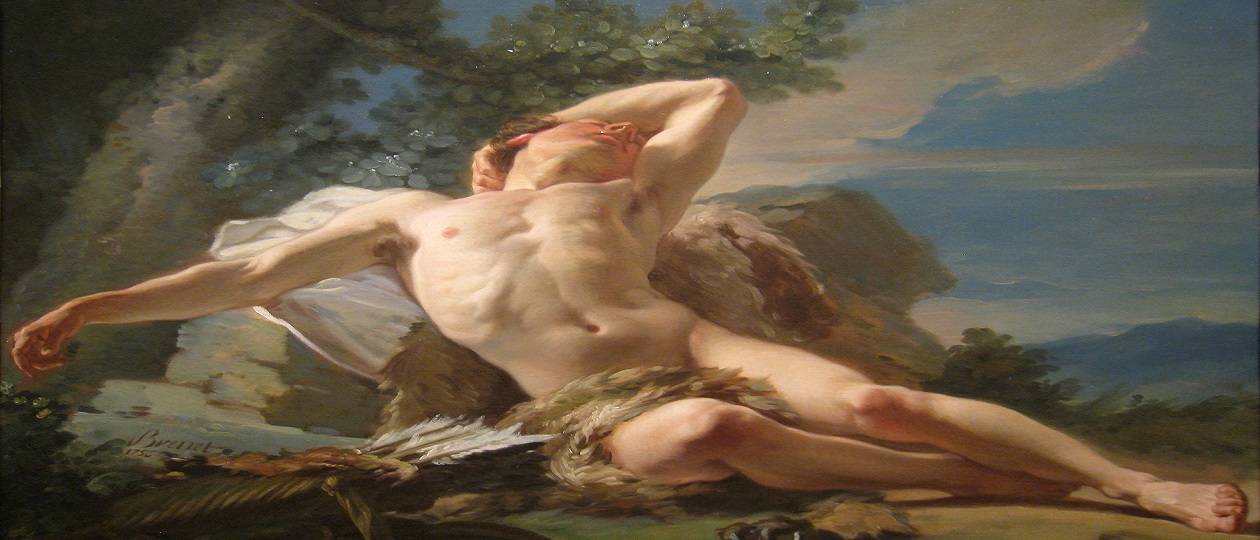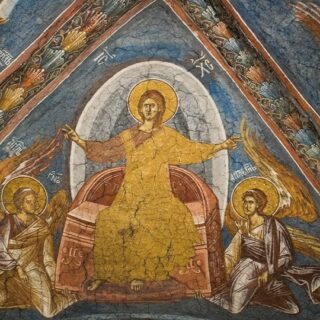
The attitudes of the early Greeks toward nature were shaped by their religion. They saw the natural environment as the sphere of activity of the gods.
Greek religion was in large part the worship of nature, and the old Greek gods were essentially nature deities. The gods ruled nature, they appeared in it, they acted through it; therefore, human activities which affect the environment often were seen as involving the interest and reaction of the gods.
Zeus was a weather god, wielding the dreaded thunderbolt.
He made the wind blow favorably or disastrously, moved the clouds, stirred up storms, thundered, lightened, and roused the waves of the sea. Of a particularly foul spell, Homer said, “Zeus rained the whole night through.” Poseidon, originally the underworld god of springs, the earthquake god who shook the mountains, became the preeminent god of the sea. Athena’s patronage of wisdom and defensive warfare were importations; her earlier concerns were the owl, the serpent, and the sacred olive tree, all objects depicted in association with a female deity on ancient Minoan seals.
Artemis, far from being only the divine huntress, was from of old “Artemis of the wild wood,” the protectress of wild animals and the guardian of the wilderness, bearing the very ancient title Potnia Theron, “Mistress of Beasts.” She was a fertility goddess who encouraged the multiplication of birds and animals.
But the true patroness of the earth’s fertility was Demeter, the goddess of plants. The growing grain, the Greeks believed, was Demeter at work.
The gods and goddesses made their homes in the wilderness, and when they invaded the world of human beings, it was out of the wilderness that they seemed to come. They loved the mountains; Mount Olympus, their chief dwelling, was the highest peak and one of the wildest in Greece. When they were not on Olympus, Zeus and Hera made “many-fountained Mount Ida, the mother of wild beasts,” their bower. Apollo and the Muses frequented the forests, crags, and springs of mountains like Helicon and Parnassus.
Greek religion had a strong sense of natural locality. The presence of the gods was felt in places of natural attractiveness and significance. The great gods and lesser deities haunted particularly wild and beautiful locations such as springs, caves, groves of trees, and places with wide and inspiring views. Specific features of the landscape, or their sprites, figured as lesser gods and goddesses in their own right. Rivers ranked among the immortals, as did the winds, and the Greeks sometimes prayed to them.
Every one of the great national shrines and temples of the Greeks had a location and an orientation which was dictated by its natural setting. Those who have been to Greece know that the oracle of Delphi was located in a spot which commands one of the most spectacular natural scenes on earth, looking up at the “shining cliffs” of Parnassus and down the canyon of the Pleistos River as far as the flashing sea. The healing shrine of Asclepius and its giant theater are set in a natural amphitheater at Epidaurus. The mountain view from the ancient shrine of Zeus at Dodona is majestic. Without any important exception, the great oracles where the gods spoke to people, the temples, the theaters where divine pageants were enacted, and the stadiums whose athletic contests were devoted to the gods were located where nature had first produced a fine wild scene. The Greeks were sensitive to the natural environment as it existed unchanged by human activities, and they responded to the beauty of places like these by dedicating them to the worship of the gods whose presence they felt there.
The association between the gods and trees was particularly close in the Greek mind, and all Greek altars and places of worship were originally outdoors in groves of trees. The practice of setting aside such a grove, called an alsos, as a sacred area of land, or temenos, of a deity, to be used only for worship, was widespread. Acts of worship generally took place outdoors; temples were only shelters for the images of the gods and votive offerings, with no place indoors for sacrifice.
Carved Minoan seals show goddesses seated under the branches of trees. There was a palm tree next to Apollo’s altar on Delos, and a laurel at Delphi. An olive tree stood next to Athena’s shrine on the Acropolis of Athens, where to protect the tree no goat was allowed to come except once a year, for sacrifice. All oaks were sacred to Zeus, especially at Dodona, where his voice could be heard in the rustling leaves. Probably the Greeks first worshiped in groves and only later built temples within them; it is certain that the association of the two was so deep that temples were always set in groves of trees, and when a grove was not available, as was the case on the rocky summit of the Acropolis when the Parthenon was built, holes were excavated in the solid rock and trees were planted in rows to flank the temple. The Greeks could not conceive of a sacred area without trees. The result of this attitude was the preservation of the sacred groves from fire, grazing, and the ax, so that they remained like parks in a seminatural state, and the trees in them grew huge with age. The cypress trees at Psophis, called the “Maidens,” reached such a height that they overshadowed a nearby hill. When the fertile plain of Crisa, near Delphi, was dedicated to the god Apollo, it was allowed to revert to a wild state, and the attempt of the Phocians to cultivate it was the official cause of the Third Sacred War. In later times the countryside was dotted with large groves of trees saved from the general denuding of the landscape, even long into the Roman period, when they aroused the wonder of travelers.
Not only trees, but also wildlife, were protected in this way.
Hunting in sacred groves was forbidden. At Pharae, fish sacred to Hermes could not be caught. Athena’s fortress in Athens sheltered small owls and a half-legendary snake. The Odyssey recounts the famous story of the wild cattle sacred to Helios, the sun god, whose slaughter brought swift punishment on the guilty. The gods were believed to appear in the forms of birds and animals at times, and to send birds and other wild creatures as omens, warnings to those who could interpret them correctly, so it is not surprising that creatures living in the sanctuaries were protected. From religious motives, then, the Greeks set aside areas which, though very numerous, were usually small and in later Greek history lost most of the wilderness character they originally possessed. It is probably stretching the point to see these as national parks in anything like the modern sense, but at least it is clear that the Greeks preserved certain natural areas.
Greek religion recognized mankind’s oneness with nature.
This attitude was exemplified in the initiation ceremony at Eleusis, where thousands of Greeks saw and heard the enactment of the mysteries of the goddess Demeter. Demeter, the guardian of growing crops, was identified with grain, the staple life-supporting food of the Greeks. An ancient myth said that Demeter’s daughter, Persephone, was once seized by Hades and carried off to his kingdom in the underworld. Demeter, in her agonized search for her beloved child, caused all plants to stop growing, threatening the destruction of life on earth. The prayers of people then swayed Zeus to decree that Persephone
should be restored to her mother if she had not eaten anything in the underworld. It was discovered that Persephone had eaten only four tiny pomegranate seeds, and so a compromise was reached. Persephone would spend four months underground each year, during which the crops would not grow, but during the other eight months, she would live with her mother, who would then cause the seeds to sprout and the world to be clothed once again in living green.
The myth was understood by the Greeks to signify the origin of the seasons. The “four months underground” are the dry season when practically nothing grows in Greece. But the Mysteries of Eleusis went beyond this simple symbolism to identify the life and death of men and women with the dying and rising of the natural world and its goddesses which can be seen every year. People die and are buried in the earth, as seeds are planted in the soil. But as seeds send forth shoots in response to healing moisture, they believed, those who were initiated into the mysteries would flourish again and live a happy, immortal life in companionship with the gods in the next world. The mystery of Eleusis was the identification of mankind with the natural world of growing plants, of sowing and harvest, in the great, never-ending cycle of being.
At Eleusis and in their other great festivals, the Greeks celebrated the cycle of the seasons. They felt a strong sense of an underlying order and balance in nature. They believed that the immortals, or a principle of justice even higher than the gods, operated to keep everything in its correct place, spatially and temporally. “The immortals have appointed a proper time for each thing upon the earth, the giver of grain.” The Greeks hated the ideas of limitlessness and chaos. In the beginning, says Homer, the world was divided into three parts, and each was given by lot to one of the three brother gods to rule; the sea to Poseidon, the underworld to Hades, and the atmosphere to Zeus, but the earth and Mount Olympus were to be held in common.
The gods rule the natural environment and manipulate it for purposes of their own, which powerfully affect the fortunes of mankind, for good or for ill.
When everything holds its proper time and place, then all is right on earth and in heaven, and justice reigns. To overstep the bounds, to attempt to change the natural order of things, is to do injustice, to upset the world and the gods. Human beings, the Greeks thought, tend to violate the order of the universe whenever, in their pride, they try to make major alteration in what is already present in the natural environment. Canals across isthmuses, for example, were strongly discouraged because they would have made islands of what were naturally peninsulas. The wall, ditch, and palisade that the Greeks had built to face the walls of Troy, according to Homer, provoked the gods to anger, and Poseidon later destroyed every trace of the structure. When the Persian king Xerxes invaded Greece, the Greek historian Herodotus recorded as evidence of the pride that goes before a fall the facts that he had a bridge of boats built across the sea at the Hellespont and ordered the waves whipped when they broke it, that he caused a canal to be cut through the peninsula of Athos, and that his army drank rivers dry and set forests on fire. When the Colossus of Rhodes fell in an earthquake, it was taken as evidence of divine anger at human presumption, and a direct order of the oracle at Delphi forbade its reerection.
The Greeks’ belief that the gods, in upholding the order of nature, would punish the transgressor supported an impressive list of taboos against pollution of various kinds. Hesiod, who as a farmer had a certain hard-bitten reverence for the earth, recorded strong prohibitions against the contamination of rivers and springs by human wastes. It might be argued that rules like these were not the result of rational recognition of hazards to health and the environment, but were dictated in an arbitrary way by purely ritual considerations. Homer, it is true, regards
Achilles’ pollution of the River Scamander with blood and corpses as an offense against the river god himself, and Scamander’s wrath takes an appropriate form. Like any choked river, he raises a flood and threatens to drown Achilles and bury him in sand, gravel, silt, and slime. At another time, the god Apollo sees Achilles dragging the mutilated, bleeding body of Hector behind his chariot and remarks, “Lo, in his fury he is dishonoring the silent earth.” But such religious taboos are more often than not the expression of deep insights into the nature of things. In any case, their effect in Greece seems to have been in the direction of preserving rather than destroying the environment. For the ancient Greeks, the natural environment was endowed with living, divine presences which maintained its order and resisted the more ill-considered actions of human beings.
But the order of nature can be broken in many ways. To the Greeks, religion was not an isolated aspect of life; it included and bore upon everything else. The gods, offended by human injustice on what would now be called the social level, could manifest their wrath in natural disasters.
And even as beneath a tempest the whole black earth is oppressed, on a day in harvest-time, when Zeus poureth forth rain most violently, whenso in anger he waxeth wroth against men that by violence give crooked judgments in the place of gathering, and drive justice out, recking not of the vengeance of the gods; and all their rivers flow in flood, and many a hillside do the torrents furrow deeply, and down to the dark sea they rush headlong from the mountains with a mighty roar, and the tilled fields of men are wasted…
Justice, to the Greeks, was not simply fairness among people; it was keeping the proper relationships among people and between people, the natural environment, and the gods, so that the whole universe might stay in balance.
The balance was maintained, they held, not only by punishments but also by rewards. The goodwill of the gods was shown toward mankind through the favorable aspect of nature. Though the gods are often contemptuous and hostile, and their benevolence can be capricious, they respond with good gifts when people act in ways pleasing to them, and care for the natural environment wisely. The orchard and vineyard of a wise Greek farmer will be unusually fruitful because they are trimmed and cultivated with skill and care. “Such,” Homer said, “were the glorious gifts of the gods.”
The way in which the natural environment, under the aegis of the gods, responds to care, good leadership, and justice is told beautifully in a simile from the Odyssey which is a perfect companion piece to the one from the Iliad quoted above. Here it must be remembered that Homeric kings went out into the fields and supervised agricultural labor — and not uncommonly they did it themselves — and that the usual epithet for a leader is “shepherd”:
Lady, no one of mortals upon the boundless earth could find fault with thee, for thy fame goes up to the broad heaven, as does the fame of some blameless king, who with the fear of the gods in his heart is lord over many mighty men, upholding justice; and the black earth bears wheat and barley, and the trees are laden with fruit, the flocks bring forth young unceasingly, and the sea yields fish, all from his good leading; and the people prosper under him.





